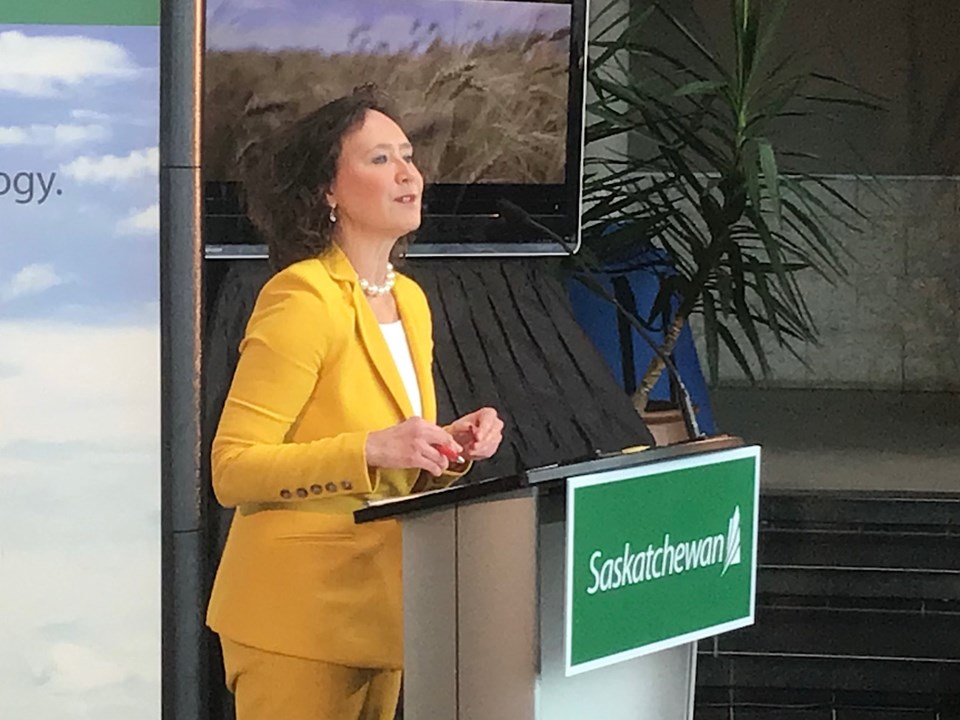REGINA — The government of Saskatchewan had announced their intentions to “go blue.”
By “blue,” they are referring to blue hydrogen. The province is moving ahead with a study on developing a potential hydrogen hub in the Regina-Moose Jaw region.
In an announcement Monday at Innovation Place, University of Regina, it was confirmed the Ministry of Energy and Resources, along with Whitecap Resources and Federated Co-operatives Limited (FCL), will be partnering to fund a foundation report study.
According to the province’s news release, this study will “provide investors with a thorough analysis of commercial-scale hydrogen opportunities and synergies with carbon capture utilization and storage (CCUS) infrastructure in Saskatchewan.”
This study would be developed by the Transition Accelerator along with the Saskatchewan Research Council. Transition Accelerator is described as a "pan-Canadian charity that creates positive, transformational system changes that solve societal challenges while moving Canada to reach net-zero greenhouse gas emissions by 2050."
The Ministry of Energy and Resources will provide a grant of $100,000 to complete the foundation report, with an additional $50,000 in funding coming from Whitecap Resources and FCL.
"Blue" hydrogen refers to the hydrogen captured or stored from grey hydrogen using carbon capture or storage technology.
In making the announcement, Energy and Resources Minister Bronwyn Eyre pointed to the potential for synergies between CCUS and enhanced oil recovery and hydrogen.
"Saskatchewan is a world leader in CCUS and enhanced oil recovery," said Eyre at the announcement Monday. "If lowering CO2 is your goal, EOR is your man. Leading international environmentalists agree that countries cannot meet global climate targets without CCUS and enhanced oil recovery technologies together. EOR is also currently the only way to generate revenues, and from revenues of course royalties, from carbon capture and storage."
The announcement of a hydrogen hub stems from the government's commitment announced last fall to advance CCUS projects in Saskatchewan. The idea, said Eyre, is that a hydrogen hub would align with CCUS infrastructure as part of a Regina-Moose Jaw industrial corridor, and allow the development of a commercial scale supply and demand chain in the province.
“We expect this report to accelerate the private sector's interest in a hydrogen economy, both regionally and province wide, by providing potential investors with a thorough analysis of what commercial scale hydrogen opportunities and local companies could look like."
She noted Transition Accelerator has an impressive record of hydrogen research and successfully launched the first two hydrogen hubs in the Edmonton and southeast Alberta regions.
Saskatchewan Research Council CEO Mike Crabtree, speaking on behalf of Transition Accelerator, said SRC was excited to be playing a role in this project. He said hydrogen is "expected to play a prominent role in reducing greenhouse gas emissions in the coming years and will help achieve net zero goals around the world."
Becoming an early adopter, he said, would allow Saskatchewan to use the skills they built to develop an integrated supply chain across Canada.
"This is a really important announcement and a tremendous step forward as we look forward and think about what the low carbon economy will look like in the future," said FCL Vice-President for Manufacturing Gil Le Dressay. He said he believes the report will be "foundational" in approaching the emerging hydrogen market.
"Saskatchewan, as you have seen here today, is a leader in carbon capture storage technology, and we believe this technology will play a significant role in our transition to a low carbon economy."


